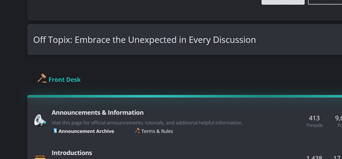- Thread Author
- #1
Google is launching a new AI-powered search results feature in the U.S. this week, starting with mobile users searching for recipes and meal ideas. This AI-driven update will present a full page of personalized, multi-format results for each searcher.
According to Google:
“This week, we’re introducing AI-organized search results pages in the U.S. — starting with recipes and meal inspiration on mobile. Users will now experience a full-page layout, offering curated results just for them. You’ll be able to browse various forms of content like articles, videos, forums, and more, all in one place.”
Key Features
The AI-organized pages will showcase content in different formats, including articles, videos, and forum threads. Google’s goal is to provide searchers with a broader range of viewpoints and sources. Google adds:
“With AI-organized results pages, we’re offering users more diverse content formats and platforms, providing new opportunities for content discovery.”
Industry Impacts
Although Google highlights the advantages of AI-organized results pages, the change raises important questions:
1. Impact on website traffic: Will keeping users on Google’s search page reduce the number of clicks to the original source sites?
2. Potential bias: AI-curated content may introduce bias in how results are presented.
3. Visibility challenges: Businesses may need to adjust their strategies to ensure their content stands out in these AI-structured results.
4. Ad placement: It’s unclear how the new format will influence the visibility of ads.
These changes may significantly alter the SEO landscape. New strategies may be needed to maintain visibility in the AI-organized results format.
In contrast, Microsoft’s Bing recently expanded its generative search features, targeting complex, informational queries. However, Google’s full-page reorganization sets it apart from Bing.
For now, the feature focuses on recipe-related queries on mobile devices, which aligns with Google’s emphasis on mobile-first indexing. Whether or not this approach will extend to desktop search remains to be seen.
Google’s Response to Concerns
In response to questions about this new feature, Google has provided the following insights:
Search Console Tracking
When asked about tracking AI-organized search results in Google Search Console, a Google spokesperson noted:
“Although we don’t track traffic from every feature separately in Search Console, site owners will still see their traffic reflected. Supported search appearances are outlined in our documentation.”
This suggests that while detailed metrics for AI-organized pages won’t be available, overall traffic data will still be accessible.
Expansion Plans
Regarding when this feature will expand to other categories and regions, Google stated:
“When we previewed this feature, we indicated that it would expand to categories like dining, movies, music, books, hotels, and shopping. There are no further updates at this time.”
Though expansion is confirmed, Google has not disclosed specific timelines.
SEO Guidance
When asked whether SEO professionals and content creators need to make changes, Google emphasized that existing practices remain effective:
“SEO professionals and content creators don’t need to change anything. The AI-organized search results pages are based on our core ranking and quality systems, which have been refined over the years to surface high-quality information.”
What’s Next?
While Google’s responses offer some clarification, there are still unanswered questions. The lack of specific metrics for AI-driven results could make it harder for SEO experts to gauge the impact on their traffic.
Google’s confirmation of plans to expand this feature across multiple industries suggests that the update could have widespread effects in the near future. Although current SEO strategies are expected to remain relevant, the SEO community will likely need to adapt as this shift in search result organization unfolds.
Source: https://www.searchenginejournal.com/google-rolls-out-ai-organized-search-results-pages/529078/
According to Google:
“This week, we’re introducing AI-organized search results pages in the U.S. — starting with recipes and meal inspiration on mobile. Users will now experience a full-page layout, offering curated results just for them. You’ll be able to browse various forms of content like articles, videos, forums, and more, all in one place.”
Key Features
The AI-organized pages will showcase content in different formats, including articles, videos, and forum threads. Google’s goal is to provide searchers with a broader range of viewpoints and sources. Google adds:
“With AI-organized results pages, we’re offering users more diverse content formats and platforms, providing new opportunities for content discovery.”
Industry Impacts
Although Google highlights the advantages of AI-organized results pages, the change raises important questions:
1. Impact on website traffic: Will keeping users on Google’s search page reduce the number of clicks to the original source sites?
2. Potential bias: AI-curated content may introduce bias in how results are presented.
3. Visibility challenges: Businesses may need to adjust their strategies to ensure their content stands out in these AI-structured results.
4. Ad placement: It’s unclear how the new format will influence the visibility of ads.
These changes may significantly alter the SEO landscape. New strategies may be needed to maintain visibility in the AI-organized results format.
In contrast, Microsoft’s Bing recently expanded its generative search features, targeting complex, informational queries. However, Google’s full-page reorganization sets it apart from Bing.
For now, the feature focuses on recipe-related queries on mobile devices, which aligns with Google’s emphasis on mobile-first indexing. Whether or not this approach will extend to desktop search remains to be seen.
Google’s Response to Concerns
In response to questions about this new feature, Google has provided the following insights:
Search Console Tracking
When asked about tracking AI-organized search results in Google Search Console, a Google spokesperson noted:
“Although we don’t track traffic from every feature separately in Search Console, site owners will still see their traffic reflected. Supported search appearances are outlined in our documentation.”
This suggests that while detailed metrics for AI-organized pages won’t be available, overall traffic data will still be accessible.
Expansion Plans
Regarding when this feature will expand to other categories and regions, Google stated:
“When we previewed this feature, we indicated that it would expand to categories like dining, movies, music, books, hotels, and shopping. There are no further updates at this time.”
Though expansion is confirmed, Google has not disclosed specific timelines.
SEO Guidance
When asked whether SEO professionals and content creators need to make changes, Google emphasized that existing practices remain effective:
“SEO professionals and content creators don’t need to change anything. The AI-organized search results pages are based on our core ranking and quality systems, which have been refined over the years to surface high-quality information.”
What’s Next?
While Google’s responses offer some clarification, there are still unanswered questions. The lack of specific metrics for AI-driven results could make it harder for SEO experts to gauge the impact on their traffic.
Google’s confirmation of plans to expand this feature across multiple industries suggests that the update could have widespread effects in the near future. Although current SEO strategies are expected to remain relevant, the SEO community will likely need to adapt as this shift in search result organization unfolds.
Source: https://www.searchenginejournal.com/google-rolls-out-ai-organized-search-results-pages/529078/


